Three lessons from Gandhi’s experiments in truth
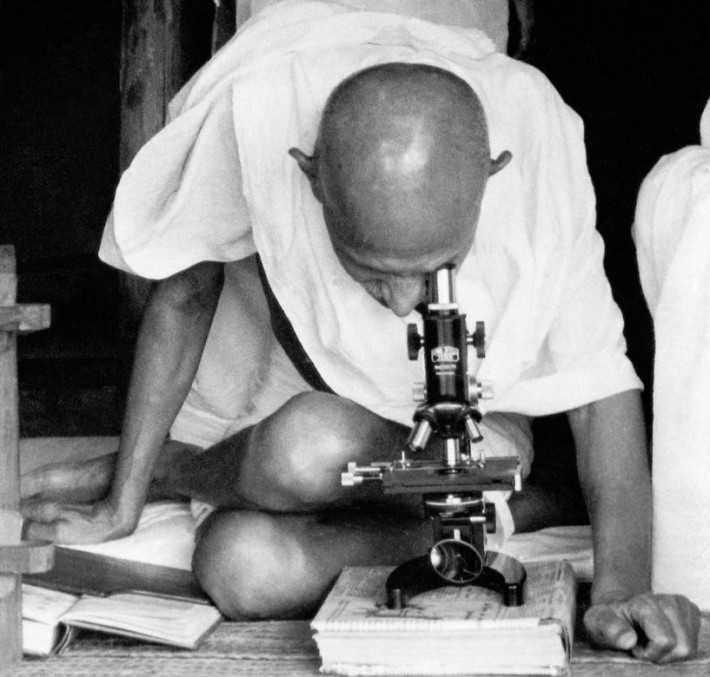
Is life a series of successes and failures, or an experiment?
I invite you to reflect on your life over the past five years. Consider the key events that shaped your experience, that helped form how you view the world today. How do you feel about those experiences? What is the story about your past that shapes how you see the world today?
These questions came to me as I finished reading Mahatma Gandhi’s autobiography, titled “Experiments in Truth”. Gandhi’s emphasis on life as an experiment is an important distinction to a typical perspective of life as a series of successes and failures.
How do you frame your life?
My recent research into performance-based self-esteem highlighted a tendency to view our life as a series of successes and failures. At any given point in time we are deemed as winning or losing based on:
- some point in our past or assumed future,
- our perceptions of those around us, or
- some other perceived standard we accept from society or others.
We can change our status by either adding more successes and failures, or by raising or lowering our perceived standard.
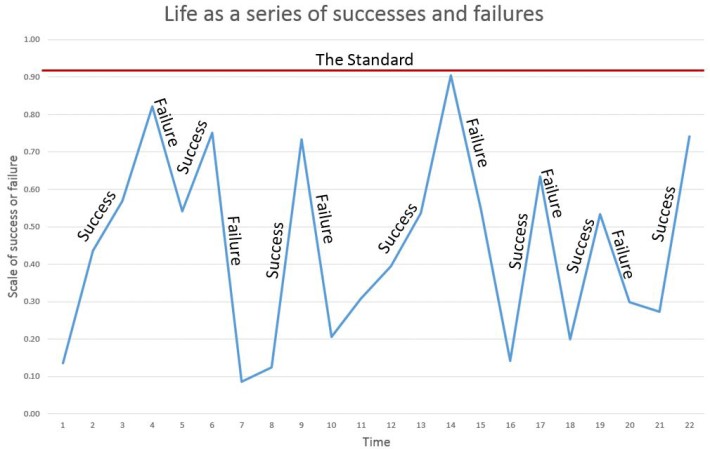
An alternative perspective, and one promoted by Gandhi, is one where life is a series of experiments. An experiment is defined as a success if something is learned as a result of an experiment. The only time an experiment fails is if there is no learning. When that happens, the experiment is repeated until there is learning and new experiments can be performed based on what was previously learned.
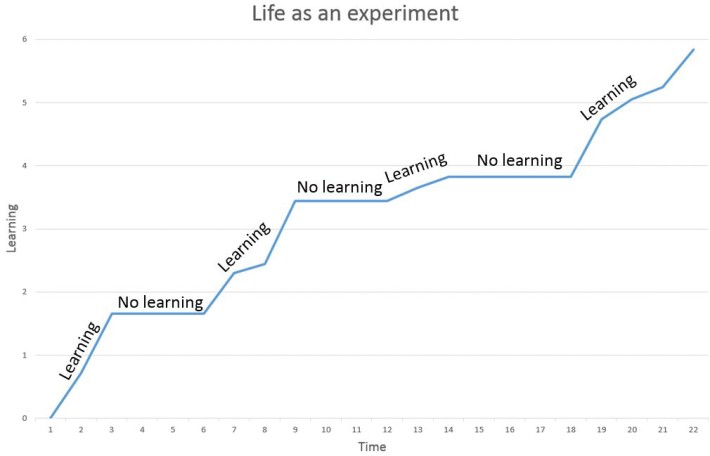
Gandhi’s experiments in truth
Gandhi applied this perspective of life as an experiment to all aspects of his life. The word “experiment” is used over 95 times in his 160 brief chapters. He applied the concept to topics such as spirituality, parenting, education, morality, medicine and more.
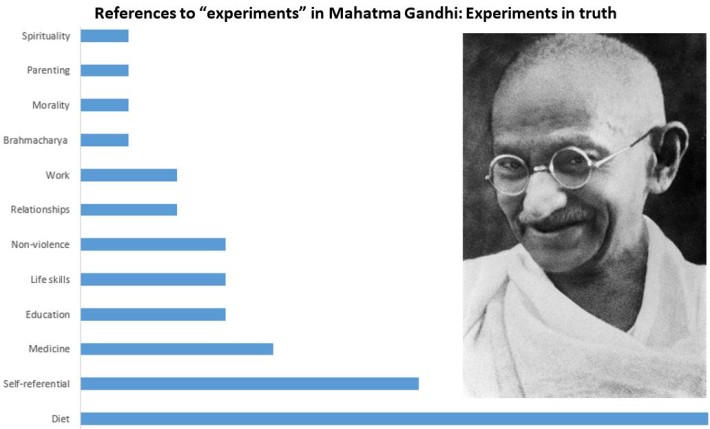
While his experiments predominantly applied to the topic of his diet, he applied these experiments to his spiritual pursuits and his search for purity, his political activities through his fasting protests, and even his role as an educator using diet and meals as teaching exercises.
Three lessons stand out to me from Gandhi’s writings:
1.Using experiments to move on from the past
Diet was a primary topic in Gandhi’s life. Some of his first experiments related to challenging his religious convention of vegetarianism and trying meat. The experiment did not go too well, and he became sick and overcome by guilt as a result.
“It began to grow on me that meat-eating was good, that it would make me strong and daring, and that, if the whole county took to meat-eating, the English could be overcome. A day was thereupon fixed for beginning the experiment.”
“The goat’s meat was as tough as leather. I simply could not eat it. I was sick and had to leave off eating. I had a very bad night afterwards. A horrible night-mare haunted me. Every time I dropped off to sleep it would seem as though a live goat were bleating inside me, and I would jump up full of remorse.”
Gandhi’s experimentation in meat was similar to other indiscretions in his youth including brushes with adultery, stealing, smoking and even contemplating suicide in response to a perceived lack of independence. These events did not define Gandhi, but he framed them as experiments and applied the lessons he learned.
Many people have events in their lives that could be perceived as failures and opportunities for regret. We are all doing the best we can with what we have at the time. This is not an excuse to underperform, but an opportunity to retrospectively treat experiences as experiments to learn from and grow.
2. Experiments to develop self-awareness
Gandhi was aware of how his body and mind were responding to his experiments. He was able to apply seemingly mundane experiments in areas such as learning how to iron collars and how to dance into personal development opportunities. Again using his experiments in diet, he was able to identify changes in his thinking as a result:
“I stopped taking the sweets and condiments I had got from home. The mind having taken a different turn, the fondness for condiments wore away, and I now relished the boiled spinach which in Richmond tasted insipid, cooked without condiments. Many such experiments taught me that the real seat of taste was not the tongue but the mind.”
A primary outcome of an experiment is to raise awareness. The outcome of an experiment is also often not related to what was being measured, with many advances in science being a result of a seemingly failed experiments. Treating life as an experiment is a process of not getting attached to the outcome but of continually asking “What is this telling me?”
3. Let your passions drive your experiments
Gandhi’s experiments were characterised by his passions for his country, for justice, and for spirituality. Once he focused on a specific area, he directed multiple parallel experiments in that area.
“But one thing took deep root in me the conviction that morality is the basis of things, and that truth is the substance of all morality. Truth became my sole objective. It began to grow in magnitude every day, and my definition of it also has been ever widening. A Gujarati didactic stanza likewise gripped my mind and heart. Its Precept-return good for evil-became my guiding principle. It became such a passion with me that I began numerous experiments in it. Here are those (for me) wonderful lines: For a bowl of water give a goodly meal: For a kindly greeting bow thou down with zeal: For a simple penny pay thou back with gold: If thy life be rescued, life do not withhold. Thus the words and actions of the wise regard; Every little service tenfold they reward. But the truly noble know all men as one, And return with gladness good for evil done.”
Gandhi’s passions drove his experiments, and the outcomes of those experiments then fueled his passions. The energy for this cycle came from a desire to search for truth and make a difference, as compared to personal status or gain.
Experimenting in your area of interest helps keep your attention. Being conscious about re-applying the outcomes of these experiments then continues to fuel your passion.
Discover your experiments

When we are young, everything is an experiment. We put things in our mouth to see what they taste like. We touch things to see what they feel like. We push and pull, smile and cry, hug and punch our way through our early years in one long experiment of life. Somewhere along the way we can lose this sense of experimentation. We can distance ourselves from any uncertainty in the present moment and become attached to a version of a future successful outcome that makes us afraid to risk and try new things.
Gandhi’s perspective invites us to reignite the sense of experimentation in life, make a difference in the short time we are here on this planet, and live a grateful life in the process. I come away with three main outcomes:
- Treat the past as an experiment, removing judgement and being grateful for the learning opportunities
- Identify what the outcomes of the experiments really mean and how to apply what was learned
- Develop a cycle of creating experiments to support passions, removing our own judgement from the outcomes, and applying the outcomes back into the passions – fueled by a cause greater than myself
Thank you for participating in my own experiment of exploring my thoughts in this blog. I would be encouraged to hear stories about your own experiments in the comments below. If your own experiments involves sharing, I also welcome you to invite others to the experiment using the social links below.

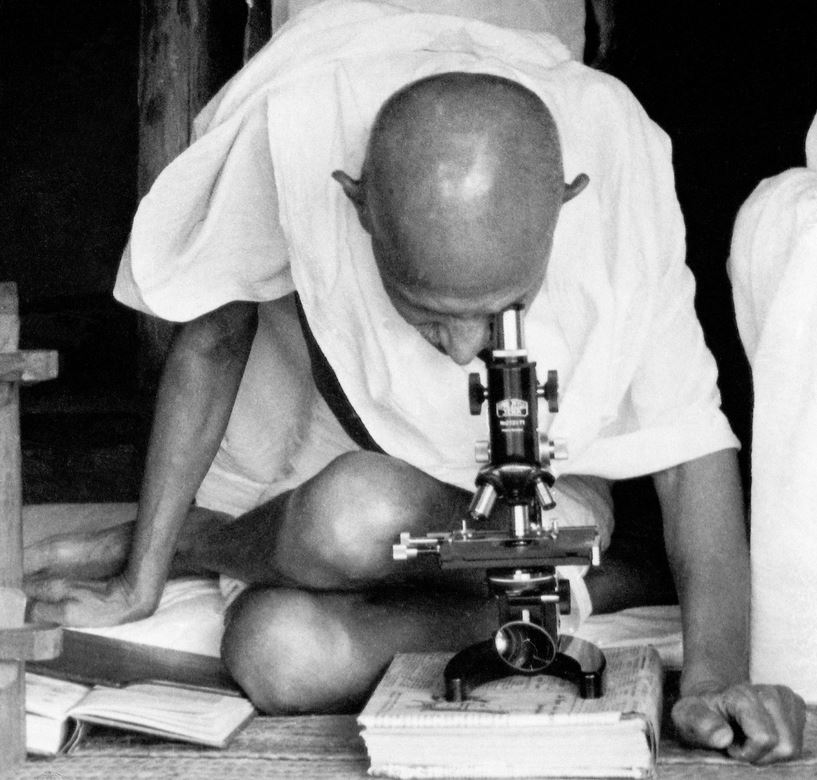
I know I seem to say it about all your posts but I really like this one Chad. I frequently like to describe myself as a student of life – always learning, never an expert. I’ll somehow have to try and work into that statement something along the lines of life and it’s experiences as experiments. This thought of ‘life as a series of experiments’ is so freeing, rather than being consumed with judging experiences as passes or fails…. Thanks once again for sharing your challenging and thought provoking wisdom 🙂
Thank you for sharing, Stace!
We all learn from the experiments of others. I look forward to learning from yours! 🙂
Chad
I must say you have very well explained the Gandhian way of experimenting so that we can analyze what’s the truth behind our beliefs. Nice post!
Thanks! 🙂